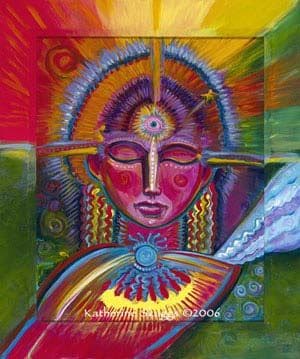Women and Emotional Labor: Putting Down the Weight

I’m increasingly convinced that the world will be healed by women’s ability to feel the full scope of OUR OWN feelings.
The paradox is that feeling the truth of our own feelings involves refusing to feel the feelings of others for them. In other words, it involves refraining from over-functioning and taking responsibility for those who are unwilling to do their own inner work.
It’s up to us to see the ways that we emotionally over-function and refrain from doing so.
Women & Emotional Labor
Traditionally, women’s work has not only been the cooking, cleaning and caring for children. Traditional women’s work has also involved bearing the emotional labor of relationships; cleaning up emotional messes, starting the uncomfortable conversations, feeling the burden of silences, living with things unsaid, burying unspoken needs, being the projection screen of disowned pain, wading through passive-aggressive slights silently, etc. The problem is that men have been traditionally taught to devalue and see emotional labor as purely women’s work, when in reality emotional intelligence and communication skills are things that both partners must shoulder equal responsibility for.
Women have historically been the “cleaning ladies” of the culture, the proverbial of trash bin of unwanted emotions: expected to feel them for others and then blamed for expressing the very emotions that others refuse to feel. It’s time to put down this role. We are clogging ourselves with material that blocks us from our own power and clarity. And we are protecting people from their own painful truths; the very truths that will free them.
I recently came across this powerful article that defines the concept of Emotional Labor and the ways it impacts women’s lives. I’ve also re-visited Audre Lorde’s powerful essay “The Erotic as Power” which explores how women are “psychically milked” in this culture, because our capacity for feeling is used in ways that benefit those in power (usually men) but denigrated when we own it for ourselves. (I highly recommend checking these out.)
It’s time to dismantle the false ethics of patriarchy that keeps women stuck in the role of emotional laborers.
For women, patriarchy conflates emotional labor with a false sense of ethics. It’s this false ethics that causes us to perpetuate our own internalized oppression. We are taught in various ways that emotional labor is an innate skill of women and if we don’t do it, the implication is that we’re not a “good person” or a “proper woman.” This leads us to feeling suspicious of ourselves if we feel fed up with it. There is a tendency to feel shame when we approach our thresholds for carrying the emotional weight for others.
You’re not being a “bad person” when you refuse to carry the emotional weight for others.
We’ve been taught to pride ourselves on the levels of our endurance to bear the responsibility for the emotional aspects of our relationships. The willingness to put up with it is rooted in a sense of scarcity; the notion that the crumbs we’re receiving are the best we can get. In many ways healing the Mother Wound is about the fundamental movement from scarcity to abundance.
Often our most potent resistance is to dropping the emotional labor we do for our mothers.
One of the most heartbreaking conversations I frequently have is when women tell me that they’re completely exhausted by feeling responsible for their mothers’ happiness. And when they consider ceasing to play that role, they question their value as a person, they feel “bad” for even acknowledging their exhaustion from it. Playing this role grinds you down to the core. (Nothing you do for your mother will be enough because what she is seeking is impossible to get from anywhere except from within herself. It’s a dead end.) Refuse to absorb the guilt. Your impulse to throw off this weight is a trustworthy impulse. The weight was never yours to carry in the first place.
We are usually trained for emotional labor by our mothers. Usually either through cleaning up our mother’s emotional messes or through observing her carry out emotional labor for others.
Recently I was speaking to a client and she summed up her relationship with her mother this way: “I protect her from herself and I end up paying the biggest price.” I hear variations from this theme all the time. For those of us who had mothers who were emotionally absent, many of us have swung the other way, becoming emotional caretakers, giving to others what we desperately needed from our own mothers.
Examples of ways we may protect our mothers from themselves:
- Showing her a mask; displaying only the emotions she would prefer
- Not confronting her when her behavior is insulting, demeaning or manipulative
- Allowing her to use you as a dumping ground for toxic negativity
- Absorbing her projections without speaking out (walking on eggshells)
- Molding yourself to cater to her insecurities and appear non-threatening
- Not setting boundaries with “mother tantrums” that arise when you express your individuality
Ways this harms us:
- Reinforces the idea that our rightful place is one of emotional dumping ground
- Fosters feelings of shame for our own separate, legitimate opinions, thoughts, observations
- Keeps our inner child stuck in unconscious patterns that reflect childhood fears and beliefs
- How we attenuate ourselves around our mothers will also show up in other contexts and relationships
Healing the Mother Wound is essential to detoxing from the role of emotional laborer. It dissolves the dysfunctional enmeshment with our mothers and creates the necessary emotional separation for us to feel our power as individuals. This emotional separation comes in the form of setting healthy boundaries that honor our personal sovereignty.
The women of the future will not do the “feeling” function for others.
When we hand back our mothers their responsibility to process their own pain, it creates the space for us to take responsibility for our own. The two go together. Carrying your mother’s pain and taking responsibility for her happiness may appear kind and altruistic on the surface, but we must see it for what it really is: Avoidance of our own power.
Know that whatever you deprive yourself of in the name of your mother is a “check” that you will present to someone else to pay back to you in the future, whether it be your partner, your child or female friends. That imbalance will seek to right itself eventually. Don’t perpetuate the debt in your mother line to the next generation. Claim your own life now! Free yourself and the generations to come.
No relationship is worth losing yourself for, including the relationship with our mothers. If your mother (or anyone else) refuses to interact with you unless you play the role of “emotional caretaker” or “emotional dumping ground”, you are not being loved; you are being used. Facing this can be really hard but face it we must if we want to truly claim our lives as our own.
It’s possible to love and be loved from a place of fullness, not deprivation.
As we learn to mother ourselves, over time, we become our own primary source of love. As we do this, our outer relationships begin to reflect the inner safety we’ve already created in ourselves. It has to happen on this inside first, then it happens on the outside.
There is nothing like being loved by someone who is already “full from within,” who has no agenda and nothing to extract from you to “feed” themselves.
This is the kind of love that, ideally, children would receive from their mothers so that they can develop a strong sense of self and belonging in their bodies and in the world. But our world hasn’t yet permitted women to develop that kind of self-love. This permission will never be granted. It’s something we must claim as our own now.
There comes a point on that healing journey when the love of our “adult self” exceeds the needs of our “child self.” Our romantic relationships then take on a new tone of maturity and freedom. We become capable of loving and being loved without need. Of course, we will experience grief if the relationship dissolves, but the dissolution of any relationship no longer mirrors that original loss of mother. You’ve created an unshakeable core of love that no relationship can disturb. You feel all your feelings fully without fear of loss.
I think the following quote sums it up perfectly…
“As long as we are looking to our partners to fulfill those functions that were not offered to us as young children, it will be difficult to come into a fulfilling, loving relationship that is not riddled by the pain of projection. Your partner is there to help you, to support you, but not to take care of or parent you. They were not put on this planet to do your work for you, but to skillfully support you as you turn toward, meet, and metabolize what has been knocking at the door of your heart for so long.” ~ Matt Licata
In addition to speaking out in ways that we’ve been silent, we also have to remain silent now in ways where we’ve spoken that gave our power away. We have to be able to endure that silence and hold our tongues where we used to fill the empty space for others who refuse to do their own work, speak their own voices and process their own pain.
This is some of the greatest service we can offer to others in our lives, even if their personalities rail against it.
When we refuse to toil emotionally for others and when we cease to ask others to emotionally labor for us, we are correcting an ancient imbalance. This imbalance is responsible for so much human suffering.
I invite you to courageously see yourself as a pioneer in righting an imbalance that women have been living with for centuries. Take the long-term view and honor yourself as a powerful piece in the collective puzzle of a new era of women’s empowerment. You are helping to build a new “mother line” not just for your lineage, but for all women. Don’t underestimate how small actions you take every day to honor yourself contribute to opening up new ways of being for all.
Art credits: The Sacred Art of Self-Love by Katherine Skaggs




